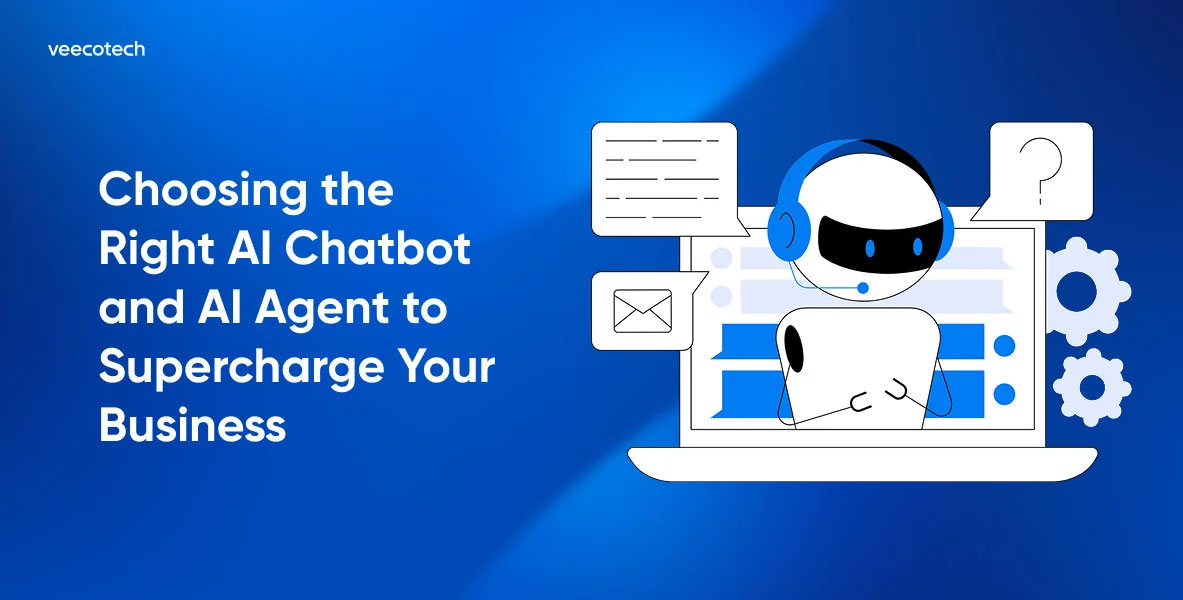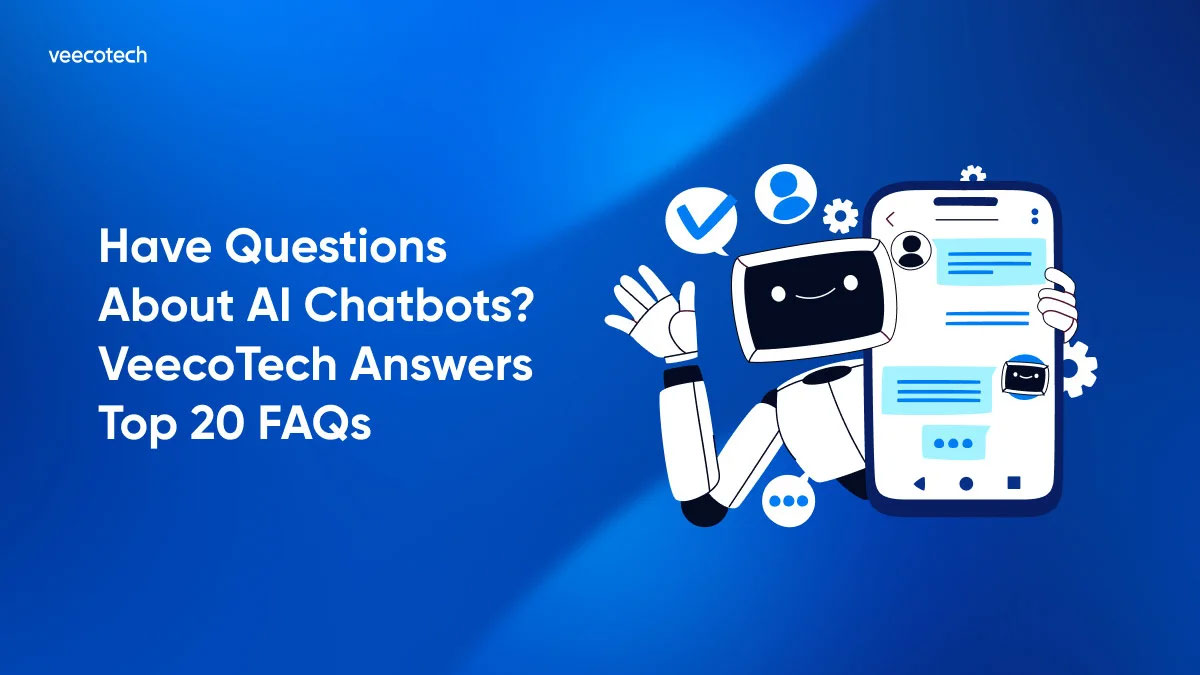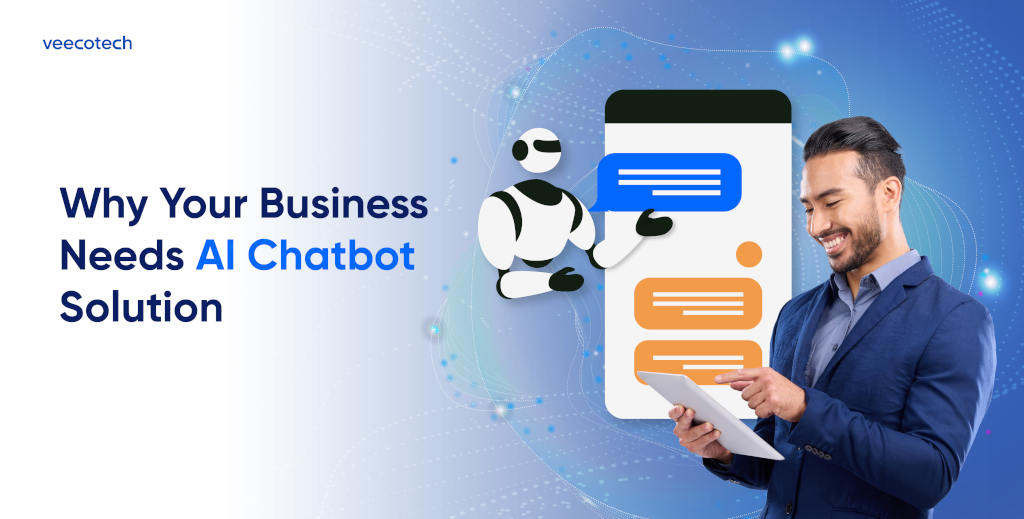Running a small business these days is like trying to juggle chainsaws while riding a unicycle. You’re stretched thin, customers expect instant answers, and you’re fighting for every scrap of market share.
You’ve probably heard the buzz about AI chatbots and agents, and how they work like magic for businesses. But are they? And which one actually helps you avoid a full-blown meltdown?
Because let’s face it, you don’t have time for another tech experiment that fails.
We’re cutting through the hype and telling you exactly what these things do, so you can figure out which one (or maybe both) can actually save your sanity and boost your bottom line.
What is an AI Chatbot?
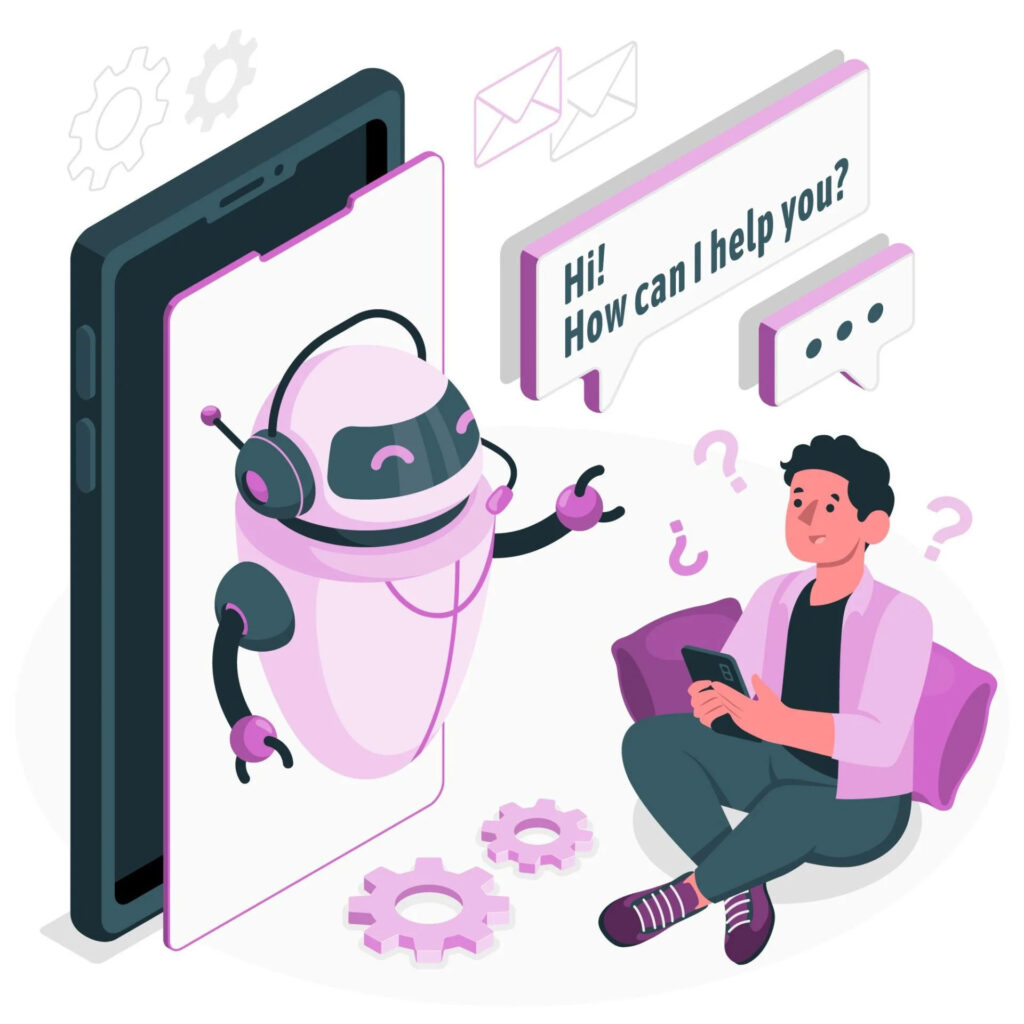
Source: Freepik
An AI chatbot is essentially a computer program designed to simulate human conversation. Think of it as a digital conversation partner built to interact with customers through text or voice interfaces.
Powered by natural language processing (NLP), chatbots can understand and respond to user queries, providing instant support and information like “What are your opening hours?” or “How do I track my package?”.
But, it’s not a mind reader – it can only answer things it’s been taught, and it can’t solve complex problems.
Key Benefits for SMEs
A report from Salesforce acknowledged that 81% customers expect faster service as technology advances, and 73% expect better personalisation, defining the need for SMEs to maximise efficiency with relevant AI tools.
Implementing chatbot technology offers a powerful solution, providing a range of benefits designed to streamline operations, enhance customer engagement, and drive growth.
Let’s have a look at their key advantages they bring for your business:
- 24-hour online customer support for customers in different time zones and even when human staff is unavailable.
- Drives lead generation and accelerates customer qualification by conducting interactive dialogues that gather crucial contact information and accurately determine lead potential.
- Automated FAQs and basic inquiries empower SMEs to drastically boost operational efficiency and customer satisfaction by instantly resolving common queries, allowing staff to focus on high-value tasks.
Practical Use Cases
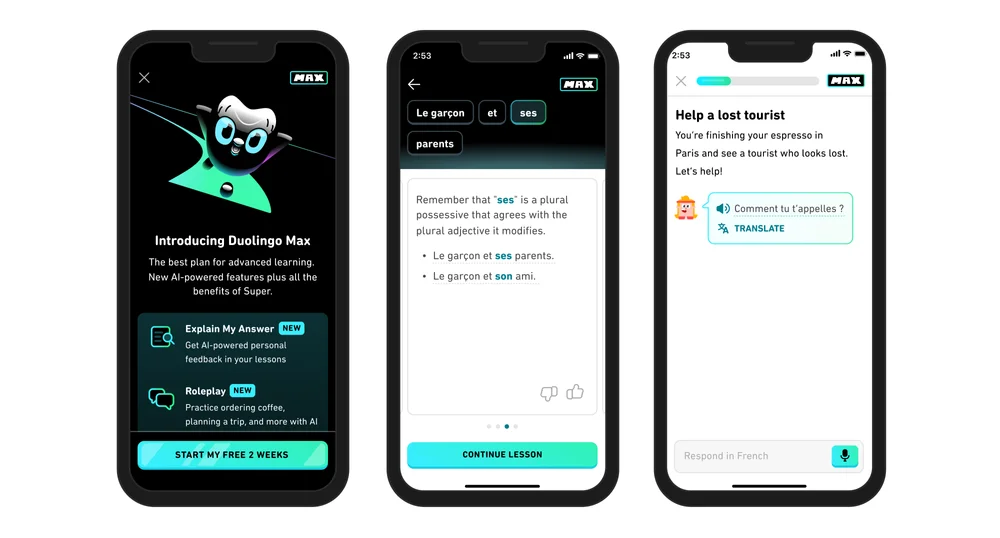
Source: Duolingo
Across virtually every sector, businesses are finding practical, tangible uses for AI Chatbots where they become essential tools in e-commerce to the appointment juggling act in service industries.
Here’s how they’re being deployed:
- E-commerce
“Where is my order?” or “What are your product recommendations?” can be easily answered by a chatbot. Online stores implementing chatbots saw a median 20% increase in order value within the first week, demonstrating rapid and significant sales impact as reported by Tidio.
In Malaysia, chatbots like Cleo from Lazada aids users in the online shopping experience, by answering questions about products, and also helps in the process of online purchasing.
- Service-Based Businesses
Appointment scheduling and initial support are also perfect for chatbots.
For service-based businesses like Yellow Class, an online education platform overwhelmed by new customer inquiries, chatbots offer a solution to the pain points of high query volume and delayed responses assisting more than 35,000 users.
When AI Chatbot Alone is Not Enough
Chatbots excel at handling simple, repetitive tasks but their limitations become apparent when dealing with complex, nuanced customer interactions.
They often struggle with maintaining contextual understanding across extended conversations, misinterpreting ambiguous language or emotional cues, and lack the sophisticated problem-solving capabilities of human agents.
If your business deals with intricate customer issues or requires advanced problem-solving, a chatbot may fall short as they heavily rely on pre-programmed responses and lack the ability to adapt to unique situations.
Therefore, relying solely on chatbots can lead to customer frustration and a diminished customer experience. A more effective approach involves a hybrid model that strategically blends the efficiency of AI with the empathy and adaptability of human agents.
This allows businesses to automate simple tasks, while ensuring that complex and sensitive issues are handled with the personalised attention they require, ultimately optimizing both efficiency and customer satisfaction.
Exploring more opportunities in AI CHATBOT? Discover the many types of AI Chatbot solutions for your business here: Why Your Business Needs AI Chatbot Solutions in 2025
What is an AI Agent?

Source: Freepik
AI agents are sophisticated artificial intelligence systems that take automation to the next level. Unlike chatbots, they are capable of understanding context and solving complex, open-ended problems with minimal human direction.
Imagine them as a highly skilled digital employee who can proactively solve problems and optimize workflows.
They achieve this through advanced technologies like Large Language Models (LLMs) and reinforcement learning, enabling them to process and interpret vast amounts of data from varied sources
These agents excel in handling ambiguity, autonomously formulating decisions, and orchestrating intricate plans, demonstrating a level of cognitive capability far exceeding that of simpler automated systems.
Advanced Capabilities that Benefit Businesses
For SMEs seeking to transform their business operations, AI agents offer a significant opportunity in streamlining workflows, revolutionising customer interactions, and unlocking the power of data-driven insights.
Here’s how AI agents are empowering SMEs to achieve greater efficiency and growth:
- AI agents enable SMEs to shift from reactive to proactive problem-solving by predicting potential bottlenecks and triggering automated solutions. These agents analyse data to anticipate issues like stock outs or customer churn, allowing for preventative actions. For instance, an agent could automatically reorder low-stock items based on projected demand, preventing stockouts and minimizing storage costs.
- They can also stretch as far as creating a sense of personalised attention by adapting to your customer’s communication style and responses based customer profiles with their deep machine learning. This behaviour enables them to deliver tailored recommendations, targeted marketing campaigns, and proactive customer support while also adapting to the companies’ own employees, by learning their working styles, and providing custom assistance.
- Strategic decisions are often hampered by limited data analysis capabilities within SMEs but AI agents can address this by providing rapid analysis of sales, customer, and market data, delivering practical insights for improved operations. This translates to optimized pricing, targeted marketing, and the identification of new growth avenues, all presented through easy-to-understand visualizations.
- AI agents seamlessly integrate with various tools like CRM and ERP, automating tasks across different platforms. This enables streamlined workflows through automated data entry, report generation, and process execution, resulting in significant time and resource savings. For example, an agent could automatically extract data from CRM software and populate it into accounting software, or trigger marketing campaigns based on sales data from e-commerce platforms.
Practical Use Cases
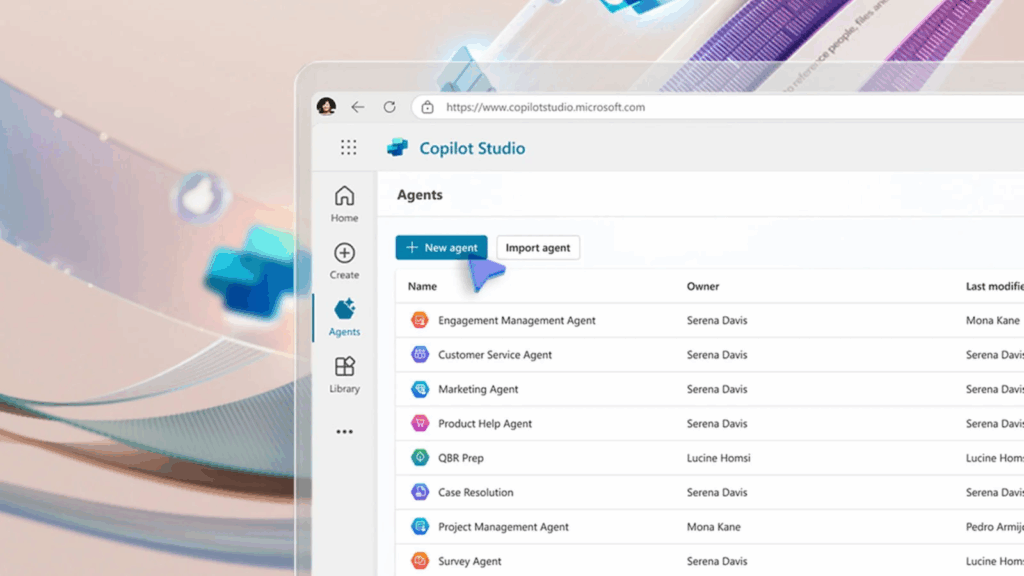
Source: Marketing-Interactive
It’s very accurate to say that businesses are rapidly accelerating their adoption of AI agents to handle more complex tasks. These trends are particularly visible in industries like:
- E-commerce
Perplexity AI has set a benchmark by collaborating a strategic partnership with Stripe that establishes a crucial layer of security, fostering consumer confidence in AI-powered shopping for customers.
- Marketing
Leading software providers, including Microsoft, are introducing AI agents designed to significantly automate key business functions, enabling companies to streamline recruitment, sales lead generation, content creation, and IT management, ultimately freeing up valuable resources for strategic initiatives.
Overcoming Implementation Challenges
Implementing AI agents is not a plug-and-play scenario so here’s a deeper dive into the challenges and solutions:
- Data Requirements
Firstly, the foundation of any successful AI deployment is robust data. SMEs should begin with a comprehensive data audit, identifying existing resources and pinpointing gaps.
This process informs the creation of a targeted data collection strategy, supplemented by rigorous cleaning and preprocessing to ensure accuracy.
- Integration Complexities
Where data is limited, exploring augmentation techniques or leveraging external datasets can prove invaluable. Integration complexities pose another significant hurdle.
Prioritizing AI solutions with strong APIs and utilizing middleware or cloud-based platforms can streamline the process. A phased implementation, starting with simpler integrations, allows for gradual adoption and minimizes disruption.
- Budget Concerns
Budget constraints, often a primary concern for SMEs, can be mitigated by opting for cloud-based AI solutions with pay-as-you-go models, leveraging open-source tools, and partnering with experienced vendors who understand SME needs.
Focusing on high-ROI use cases and conducting proof-of-concept trials further ensures cost-effectiveness.
- Data Privacy and Security
Beyond technical considerations, ethical implications demand careful attention. Data privacy and security must be paramount, with SMEs adhering to relevant regulations and implementing robust safeguards.
This includes obtaining explicit consent, encrypting data, and conducting regular security audits.
- Building Customers’ Trust Through Transparency
Transparency is key to building customer trust; SMEs should clearly communicate how AI is used, offer opt-out options, and provide explanations for AI-driven decisions. Establishing accountability through designated oversight and audit trails ensures responsible AI deployment.
Businesses that proactively address these implementation and ethical considerations, can effectively integrate AI agents, fostering innovation while maintaining customer trust and ethical integrity.
Choosing the Right AI Solution for Your Business
In just four years, by 2028, Gartner forecasts that 15% of routine business decisions will be handled by autonomous AI agents, a stark contrast to today’s landscape.
To capitalize on this transformative technology, companies must proactively assess their requirements and invest in AI solutions that are not only useful but also tailored to their specific business context.
A key part of this strategic selection is understanding the distinct differences between AI chatbots and AI agents. Businesses must discern which tool best aligns with their operational means, as they present different functionalities:
| Feature | AI Chatbot | AI Agent |
| Primary Function | Conversational interaction, information retrieval, basic task execution. | Autonomous task execution, complex decision-making, proactive problem-solving. |
| Complexity | Relatively simple, often rule-based or reliant on predefined scripts. | Highly complex, uses advanced AI (like large language models) to understand context, learn, and adapt. |
| Autonomy | Limited; follows scripted paths, requires human oversight for complex issues. | High; can independently plan and execute tasks, learn from experiences, and make real-time decisions. |
| Contextual Understanding | >Basic; understands keywords and simple phrases, may struggle with nuanced or complex queries. | Advanced; understands context, intent, and can handle complex, multi-step interactions. |
| Use Cases | Customer support, FAQs, basic information dissemination, simple task automation. | Complex workflow automation, data analysis, intelligent process optimization, proactive problem resolution. |
| Learning Capabilities | Limited learning, mostly based on updating pre-existing training data. | Capable of advanced machine learning, and dynamic learning, based on interactions and data processed. |
Imagine AI as an office setting where the AI chatbot is like a receptionist, diligently answering calls, directing visitors, and providing basic information. They’re great for handling routine tasks and following established procedures.
On the other hand, an AI agent is more like a highly skilled executive assistant – going beyond simple tasks, managing complex schedules, anticipating needs, and making independent decisions. Their role is to proactively address issues and optimize workflows, essentially acting as a strategic partner rather than just a task executor.
The choice between AI chatbots and agents hinges on your business’s specific needs.
- For companies aiming to automate routine customer service or deliver consistent, quick information, chatbots offer a sufficient and cost-effective solution.
- However, when the goal is to automate complex workflows, optimize decision-making, or extract deep insights from data, AI agents become essential.
Hybrid Approaches: The Best of Both Worlds
Recognizing that many businesses operate within a spectrum of complexity, hybrid approaches offer the best of both worlds.
The adoption of chatbots for initial interactions—like answering FAQs or gathering basic data—and seamlessly escalating complex issues to AI agents for advanced problem-solving will provide the ideal efficiency needed for a company’s function.
Crucially, this strategy applies equally well to internal operations, where chatbots can streamline data entry, and AI agents can tackle sophisticated data analysis, maximising overall operational efficacy.
Staying ahead of the curve in AI is crucial – check out Malaysia’s AI Landscape & What It Means For Businesses (2025).
Essential Tools & Resources for Your Business
Demystifying AI implementation starts with accessible resources.
Here’s a compilation of the different platforms and research hubs for your business to navigate the world of artificial intelligence:
1. User-friendly Platforms
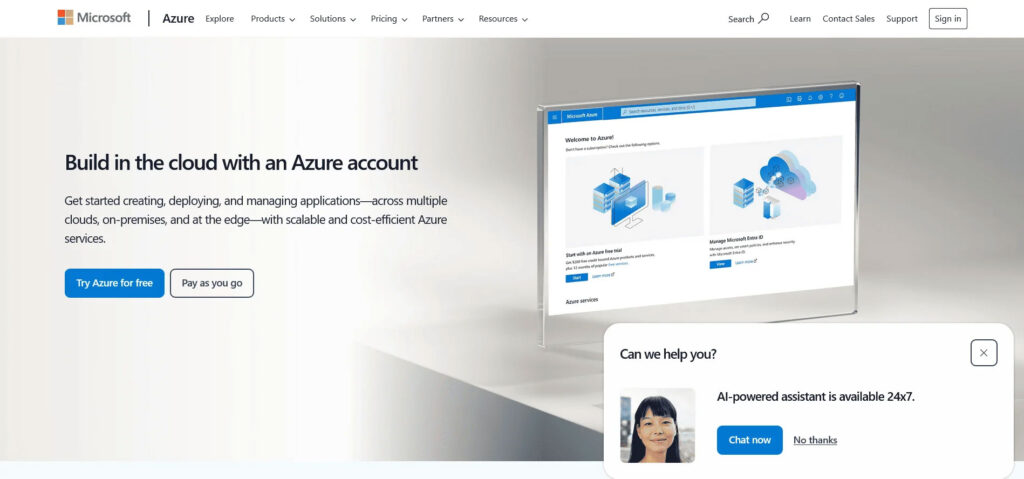
Microsoft Azure offers a wide range of AI services, including NLU, machine learning, computer vision, and cognitive search for businesses. They have customisable models which allow businesses to build and train custom AI models to meet their specific needs.
Their Azure Bot Service also aids in the creation and deployment of intelligent bots.
With a proven track record, demonstrated by its adoption by 95% of Fortune 500 companies, Azure offers a reliable and scalable AI foundation for your business.
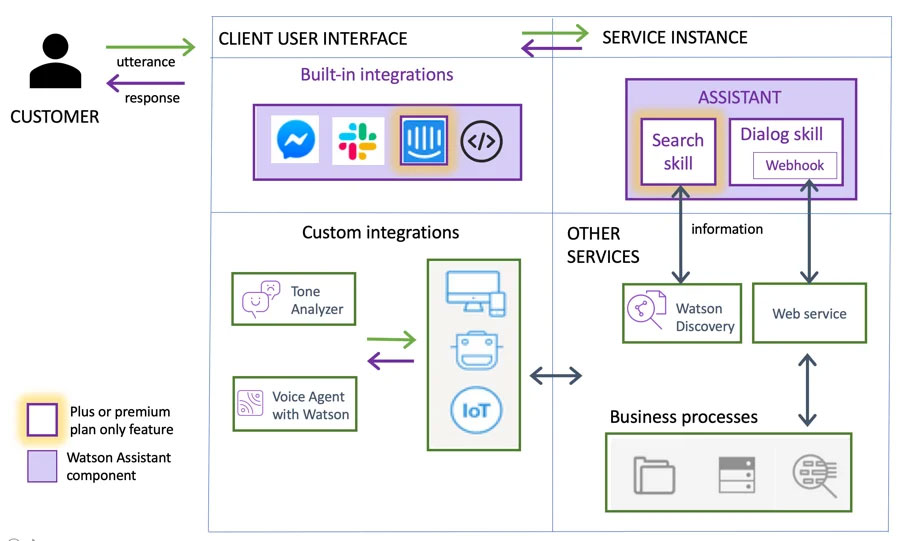
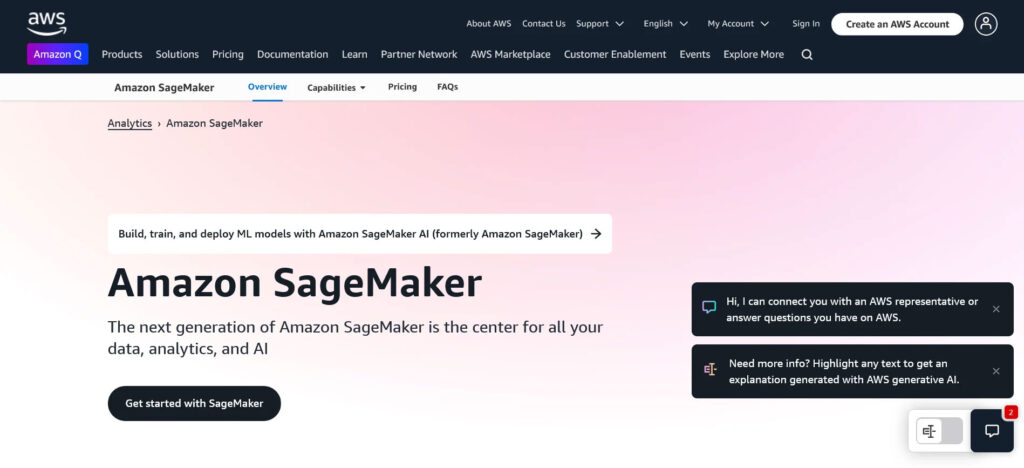
Amazon SageMaker empowers businesses to seamlessly integrate machine learning into core operations, driving significant improvements across various sectors.
For example, retailers can leverage SageMaker to personalize customer experiences through predictive analytics, while manufacturers can optimize production processes with predictive maintenance models, reducing downtime and costs.
2. AI Research Papers
Staying up-to-date with the latest AI research can help businesses identify new opportunities and develop innovative solutions.
AI’s rapid evolution presents a constant stream of novel methodologies, algorithms, and applications that can be leveraged to revolutionize operations and create new market opportunities.
Platforms like arXiv, Google AI Research, and Microsoft Research provide just the access you’ll need to cutting-edge research papers helping you unveil emerging trends and breakthroughs.
Transform Your SME with AI Today!
Malaysia stands at the forefront of AI innovation with its rapid technological advancements and a digitally fluent population.
This surge in adoption by both businesses and government signals a transformative era, where AI will redefine customer engagement and accelerate digital evolution across the nation.
Why let potential remain untapped?
If your SME is eager to leverage AI but faces funding hurdles, we’re here to bridge the gap!
As an experienced AI chatbot developer and software house, the VeecoTech team has been trusted by MNCs like Intel and government-linked organisations such as MCMC, MBPP and more.
VeecoTech also offers financing solutions tailored for SMEs, including grants like the NCER Grant, which can be particularly beneficial for businesses focused on software development.
If you’re looking to expand your AI capabilities, such as building advanced chatbots and AI agents, these grants can provide crucial funding for your business.
Seize the moment and propel your business forward with AI-driven solutions today with these 18 Latest SME Grants for Malaysia’s Businesses (2025)!
Frequently Asked Questions
1. Are AI chatbots limited to just website interactions?
No, that’s a common myth. While websites are a popular deployment point, AI chatbots are highly versatile. They can be integrated into messaging apps, social media platforms, mobile applications, and even within products themselves.
By doing this, it allows businesses to reach customers across various channels, providing consistent support and engagement.
2. Will AI chatbots replace human customer support agents entirely?
That’s a misconception. AI chatbots are designed to augment human agents, not replace them. They act as “co-pilots,” handling routine tasks and initial inquiries (L1 and L2 queries).
Thus, frees up human agents to focus on complex issues that require critical thinking, problem-solving, and emotional intelligence.
3. Are AI chatbots expensive to implement and maintain?
AI chatbots are not necessarily costly for businesses to implement and maintain. In fact, many chatbot vendors offer flexible pricing plans, including subscription-based and pay-as-you-go options, making them accessible to businesses of all sizes.
Furthermore, the efficiency gains and cost savings achieved through automation can result in a significant return on investment (ROI).
4. What are the different types of AI agents?
- Simple Reflex Agents: These react directly to current situations with pre-set rules.
- Model-Based Reflex Agents: They use an internal model of the environment to make decisions.
- Goal-Based Agents: They plan actions to achieve specific goals.
- Utility-Based Agents: They choose actions that maximize a “utility” or desired outcome.
- Learning Agents: They improve their performance over time through learning and experience.
5. Why are AI agents considered more advanced than AI chatbots?
- Advanced reasoning and planning.
- Autonomous decision-making.
- The ability to interact with and modify their environment.
- The ability to learn and adapt to new situations.
6. Do AI agents use AI chatbots?
Yes, AI agents can incorporate chatbot functionality as a part of their overall capabilities. For example, a personal AI assistant might use a chatbot interface to communicate with the user while also performing other tasks in the background.
Looking for the best software development services?
Partner with VeecoTech, an award-winning agency in Malaysia. We’re ready to bring your vision to life, delivering the results your business needs.

